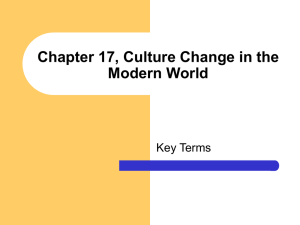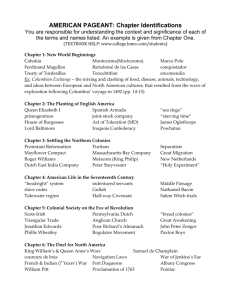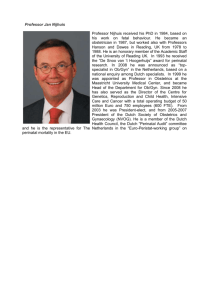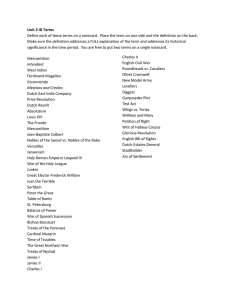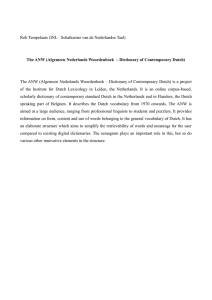Dutch BA LONDON'S GLOBAL UNIVERSITY www.ucl.ac.uk/prospectus/elcs UCAS code: R911
advertisement
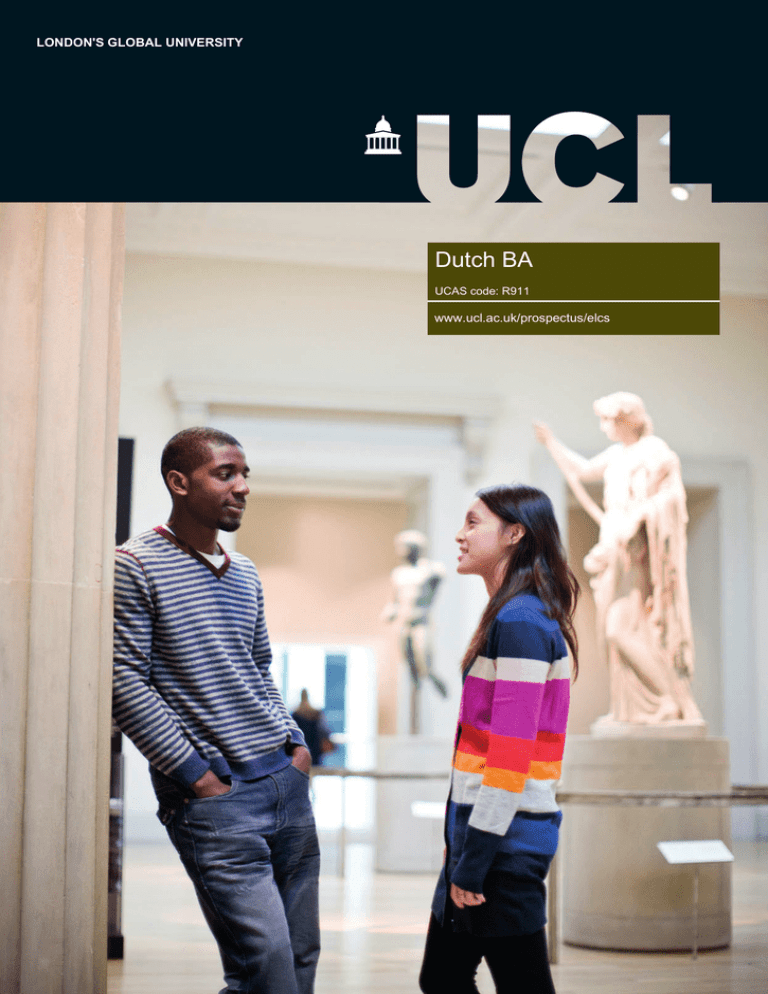
LONDON'S GLOBAL UNIVERSITY Dutch BA UCAS code: R911 www.ucl.ac.uk/prospectus/elcs DUTCH BA This four-year programme focuses on the language, culture and history of the Netherlands and Flanders, two regions neighbouring the UK that are among its largest trading partners. Students start learning Dutch from scratch and graduate as fluent and interculturally competent speakers of this global language. Your learning Degree summary Your career • No previous knowledge of Dutch is required, as you will receive intensive language training in the first two years if you start the subject from scratch. You may also start as a more advanced speaker of Dutch. • You can go on summer language courses after the first year and will spend the third year of study in Holland or Flanders (the northern part of Belgium), benefiting from the extensive contacts the department has with Dutch and Belgian universities including Amsterdam, Utrecht, Leiden and Antwerp. A substantial number of our graduates use their language skills in a variety of contexts, such as public relations (often for multinational companies, of which plenty have Dutch origins), insurance, banking, political and cultural institutions, or in teaching and translating. Some graduates go on to Master's or PhD programmes. • • You will study in a small, friendly department which has a staff-student ratio unusual in higher education. You will have access to the most comprehensive Dutch Library in the English-speaking world, including our collection of Dutch and Belgian films and documentaries on DVD and multimedia learning resources. The Dutch BA is a four year, single-subject programme. Each year students take a total of four course credits. The intensive language course develops practical language skills while the cultural studies courses focus on issues of identities and communities, and ways of investigating contemporary culture. Aside from core courses you can choose options in literature, history and sociolinguistics. You may also take School of European Languages, Culture and Society (ELCS) courses, which allow students to study literature, film, art and culture from outside their subject area(s), focusing on broad cultural movements, issues and approaches from an interdisciplinary perspective and drawing on the full range of specialisms within the school. The third year of study is spent in the Netherlands or Belgium during which you may study at a Dutch or Belgian university, teach as a language assistant, or work on placement in a field related to your studies or intended career. We teach Dutch using modern communicative methods to develop fluency, accuracy and an understanding of stylistic issues. Literature, history, linguistics and cultural studies are taught through a mixture of seminars, group work, web-based courses and tutorials. You will be able to get involved with VirtualDutch, a collaborative teaching network between UCL and Cambridge, Sheffield and Nottingham Universities. Courses are assessed by various methods: written and oral/aural examinations, essays, presentations and project work. There is significant and growing demand for Dutch-speaking graduates, despite the recession, as evidenced by regular requests from employers to the department. In the English-speaking context, a university graduate with a good command of Dutch is rare indeed, giving the graduate in Dutch a major asset. Belgium and the Netherlands belong to the world's most advanced manufacturing and trading areas and are among Britain's largest trading partners, housing the headquarters of numerous multinational companies and the political heart of the European Union and NATO. Dutch has 23 million speakers worldwide and Afrikaans, closely related to Dutch, has some 17 million. First career destinations of recent graduates (2008-2010) of this programme include: • • Financial Analyst, Pernod Ricard (2010) • • • Research, Reed Business Information (2009) Ethnic Minorities Disability Project Officer, Hampstead County Council (2010) Policy Officer, Royal Netherlands Embassy, London (2009) HR Administrator, Tribal Plc (2008) Degree structure In each year of your degree you will take a number of individual courses, normally valued at 0.5 or 1.0 credits, adding up to a total of 4.0 credits for the year. Courses are assessed in the academic year in which they are taken. The balance of compulsory and optional courses varies from programme to programme and year to year. A 1.0 credit is considered equivalent to 15 credits in the European Credit Transfer System (ECTS). Year One Compulsory courses Dutch Language I Optional courses You will select courses from a wide range of options. Options may include: Born out of Rebellion: The Netherlands from the Dutch Revolt to the Eve of World War I Modern Dutch Literary Texts You may also choose courses from a wide range offered by the School of European Language, Culture and Society, which may include: Historical Linguistics: Language Birth, Death and Decay The Holocaust Witnessed: Remembered, Represented Introduction to the Study of Language Language in Society: Introduction to Sociolinguistics Nationalism and Ethnicity in Contemporary Europe and many more. Year Two Compulsory courses Dutch Language II Optional courses You will select courses from a wide range of options. Options may include: At the Crossroads Of Europe: Belgium, Netherlands, Luxembourg in the 20th and 21st Centuries Multiculturalism and Identity 20th Century Dutch Literature: Themes You may also choose courses from a wide range offered by the School of European Language, Culture and Society, which may include: Historical Linguistics: Language Birth, Death and Decay The Holocaust Witnessed: Remembered, Represented Introduction to the Study of Language Language in Society: Introduction to Sociolinguistics Nationalism and Ethnicity in Contemporary Europe and many more. Year Three Year spent abroad in the Netherlands or Flanders Year Abroad Project Year Abroad Oral Assessment Final Year Compulsory course Dutch Language III Optional courses You will select courses from a wide range of options. Options may include: Advanced Translation from Dutch into English Contemporary Culture and History of the Low Countries Contemporary Culture and Society of the Low Countries Dutch Literature 1930-present Dutch Renaissance and Golden Age Literature Project in Dutch ELCS Advanced Level courses Entry requirements A levels staff. You may be asked to respond to an admissions questionnaire and/or attend an interview. Fees A level grades ABB UK/EU fee £9,000 (2012/13) A level subjects Foreign language preferred. Overseas fee £14,000 (2012/13) AS levels A pass in a further subject at AS level or equivalent is required. Notes Details about financial support are available at: www.ucl.ac.uk/study/ug-finance GCSE English Language at grade B, plus Mathematics at grade C. For UK-based students a Foreign Language at grade C is required. Contacts Contact IB diploma Ms Gemma Barber Admissions Officer IB points 34 Email selcs.admissions@ucl.ac.uk Subjects A score of 16 points in three higher level subjects preferably including a foreign language, with no score lower than 5. Telephone +44 (0)20 7679 3096 Prospectus entry www.ucl.ac.uk/prospectus/elcs Other qualifications Key facts Full lists of all degree programmes and other entry requirements can be found on our website at: www.ucl.ac.uk/otherquals RAE Interdisciplinary: not an assessed unit Department School of European Languages, Culture and Society Faculty Arts and Humanities University Preparatory Certificates UCL's University Preparatory Certificates (UPCs) are intensive one-year foundation courses for international students of high academic potential, who are aiming to gain access to undergraduate degree programmes at UCL and other top UK universities. For more information see our website: www.ucl.ac.uk/upc Your application Application for admission should be made through UCAS (the Universities and Colleges Admissions Service). Applicants currently at school or college will be provided with advice on the process; however, applicants who have left school or who are based outside the United Kingdom may obtain information directly from UCAS. • Visit the UCAS website: www.ucas.com You are able to take this programme without any previous knowledge of Dutch. However, the degree does require an interest in languages and a proven ability in language learning (see entry requirements). We take into account your academic performance and educational background, but also place great importance on your personal statement, your motivation to study Dutch, and your referee's report. If your application demonstrates that your academic ability and motivation makes you well-suited to our degree you will be invited to attend an applicant open day and will have the opportunity to meet a member of PDF Updated: May 17, 2012
